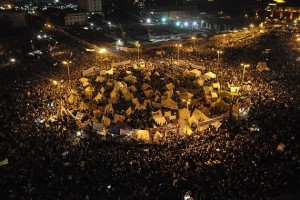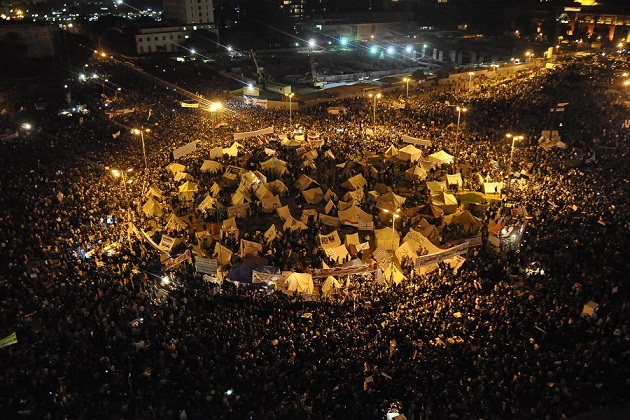
Opposition groups called for a second consecutive day of mass protests on Saturday in Tahrir Square and also in governorates throughout Egypt.
The Saturday protests came on a day when the Muslim Brotherhood and other supporters of President Mohamed Morsy had filled the streets in front of Cairo University.
“In Tahrir it’s the majority actually; at Cairo University is a small number,” said Al-Dostour Party founding member Jermeen Nasr. She echoed the Governor of Giza who stated that the square in front of Cairo University can only hold a fraction of the number that it takes to fill Tahrir.
The continuing opposition protests have two aims: to overturn the constitutional declaration; and to stop the ratification of the draft constitution, which they say is illegitimately conceived and does not represent all Egyptians.
In their call for protests Al-Dostour, warned the president that he would bear full responsibility if any violence takes place as his supporters take to the already volatile streets.
About fifty tents still filled Tahrir Square on Saturday as the opposition protesters continue their sit-in. “We will stay for another week,” said Nasr. “Last night, ElBaradei, Hamdeen Sabahi and other public figures stayed overnight.”
Nasr said this continuing pressure will force the dissolution of the Constituent Assembly and the repeal of Morsy’s recent constitutional declaration.
Hesham Akram, the deputy head of Al-Adl Party, said there was a meeting in the Tahrir last night where people expressed fear that the will of the people there may be waning.
“We stayed during Mohammed Mahmoud for almost a month,” said Akram. “This is a long battle that we cannot shy away from in any way, shape or form.”
Akram argued that this week’s protest have attracted such a wide breadth of people because Morsy’s actions threaten to directly affect the way many Egyptians live their day-to-day lives.
“In the first revolution, some of the educated and the upper middle income Egyptians did not go down to Tahrir because they did not have serious concerns; because it wouldn’t really change their way of living. However, this time around everyone is taking to the street because if the Islamists have their way they will have impact on the way we live. We will not have the same civil liberties, we will not be able to raise our children the same way, we will not be able to say what we want without being called blasphemous.”
Hamdeen Sabahi’s Popular Current also called for protests on Saturday and asked backers to “protect” Tahrir. Over the weekend activists have been checking identification at the various entrances to Tahrir. The process is far from official or comprehensive, but could spark conflict if pro-Morsy marchers ever head to Tahrir.
As of the early evening on Saturday, no clashes had been recorded in Cairo. This, said Akram, is to the Islamists’ credit. “Everybody has the right to protest. It’s a good thing that they protested somewhere that would not lead to clashes between the two factions.”
It was not the type of protest that bothered Akram, but rather the fact that there needed to be one at all. “An elected president does not need to do a show of force, the opposition does that. I’ve never seen a democracy do that.”
He went on to say that this reaction to the division in the country shows that the Muslim Brotherhood is more willing to exacerbate the polarisation rather than work toward bring the two sides together.
The opposition also made moves to avoid a confrontation. A march by anti-Morsy Cairo University students was planned to head from their campus to Tahrir, but was cancelled over fears of inciting violence.
The 6 April Youth Movement still held its march from Shubra to join the opposition in Tahrir.

